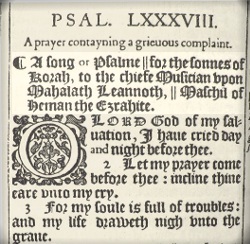What Should We Do with Those Psalm Headings? A Theory
 Reposted with permission from Toward Conservative Christianity.
Reposted with permission from Toward Conservative Christianity.
Thirtle’s Theory
I have been among those who committed the error of publicly reading a psalm and omitting to read the title. I reasoned that these titles probably belonged in the same category as the chapter and verse numbers of our Bibles: helpful, but by no means inspired.
I’ve since been divested of that view, and now see these titles as God-breathed, like all Scripture. One sees evidence for this in several ways. For example, the title of Psalm 18 is found within the text of 2 Samuel 22:1, showing the psalm title’s authenticity. It was not a later rabbinic interpolation. Further, some of the psalm titles (e.g. 46 & 58) were merely transliterated by the translators of the Greek Septuagint (c. 300-250 B.C.). This suggests that their meaning had already been lost by the time of the Septuagint, which in turn suggests great antiquity. They are much older than a post-exilic rabbinic commentary. Finally, Scriptures like Luke 20:42 quoting Psalm 110) take the title as true, for nowhere else is it stated that David himself wrote the psalm.
I was recently introduced to the fascinating theory of James Thirtle regarding the psalm titles. To quote the ISBE, Thirtle’s hypothesis is that
…both superscriptions and subscriptions were incorporated in the Psalter, and that in the process of copying the Psalms by hand, the distinction between the superscription of a given psalm and the subscription of the one immediately preceding it was finally lost. When at length the different psalms were separated from one another, as in printed editions, the subscriptions and superscriptions were all set forth as superscriptions. Thus it came about that the musical subscription of a given psalm was prefixed to the literary superscription of the psalm immediately following it. (John Richard Sampey, “Psalms, Book of,” in International Standard Bible Encyclopedia. Wm. B. Eerdmans Publishing Co., 1939. 4:2487-94.)
 First appearance at SharperIron posted 2/12/09.
First appearance at SharperIron posted 2/12/09.
Discussion